The Taste of the Next Generation
Assassin’s Creed, which hits the Xbox 360, PS3, and PC platforms later this fall, has been one of those games that has become synonymous with the “next generation.” Whenever anyone brings up the opinion that most “next gen” games are just prettier versions of games we’ve been playing for years, the seemingly automatic counter-argument has been, “Well, just wait for (insert game here).” Eight times out of ten, the game mentioned is Assassin’s Creed. Could it really be the next generation’s shining example of what could be possible in the future? Or will it just be another C+ game made even worse by months of hype? No one can say for sure just yet, but there are good points on both sides of the issue.

Just in case you haven’t heard about Assassin’s Creed yet, or it has been so long since it was announced that you’ve forgotten, here is a little background. The game puts you in control of an assassin named Altair, who is seeking to quell the conflict brought about by the Third Crusade. Yup, you read that right; Assassin’s Creed takes place in the year 1191 AD in the Middle Eastern region known as the Holy Land. Anyway, by working in secrecy and (duh) assassinating certain key players in the conflict, Altair hopes to bring peace to the land. Anyone who watches the news knows that Altair didn’t do a very good job, but his longstanding success aside, Altair has his mission and it is up to you to help him complete it.
So what sets Assassin’s Creed apart from the other hundreds of silent assassin games? Basically, Assassin’s Creed the ultimate “choose your own adventure” story. There have been a lot of games that claim to have a fully interactive, go anywhere, do anything environment, but this game might be the first to deliver the experience. Altair can climb and/or enter every building in the game’s massive city environment. Imagine if a Grand Theft Auto game let you enter any and every building in the city; that is exactly what we’ll be doing in Assassin’s Creed. Adding to the sense of freedom is the ability to either fight or escape from guards, choosing which missions to take and which to skip and the strange “whole body” control scheme.
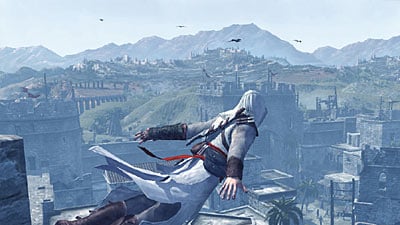
Oh, you haven’t heard about Assassin’s Creed’s controls? Most who have had a chance to try the game agree that they are unusual and take some getting used to but make perfect sense in context. Rather than simply assigning a singular button a command like “jump” or “climb,” each button controls a limb of your body. Left foot, right foot, left hand…you get the picture. When scaling buildings, you realistically grab for any handhold using the button (or limb) closest to it. Using this method, you can climb every building in the game. It looks like the days of holding “up” to climb a ladder are long over.
Another odd aspect to the control is the run button. Holding the button down will launch Altair into a full-out sprint. If you approach a building in your sprint, Altair will run right up its side and grab for the first hold he sees. This takes some getting used to, but it looks great in the hands of someone who knows what they’re doing.
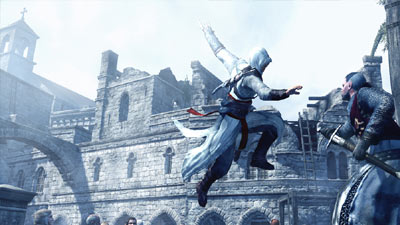
From what we’ve seen so far, Assassin’s Creed has quite a few positive aspects. You can’t have positives without negatives though, and Assassin’s Creed has a few. In its current state, the game has some problems with hit detection and walking through walls. Since the game hits stores in November, we’re hoping Ubisoft has the time required to iron out all the kinks.
Speaking of Ubisoft, their involvement is another strike against the game. The companies hit or miss ratio is not the best in the business. Think about all the Ubisoft games that have lived up to their early hype. King Kong? Nope. Red Steel? No way. Prince of Persia? The first modern entry in the series was a masterpiece (Sands of Time), but the two subsequent games have been terrible. Not to mention that Ubisoft has proven again and again that they simply can’t develop good games for certain systems. Nintendo DS fans know that if Ubisoft’s purple and silver circle appears on the packaging, it is best to save their money. With the infancy of the new generation of consoles, gamers have every right to be unconvinced on Assassin’s Creed until they play it themselves. Right now the game looks great, but should gamers anticipate a game from the makers of the PS2 crudbucket known as “Charlie’s Angels?”
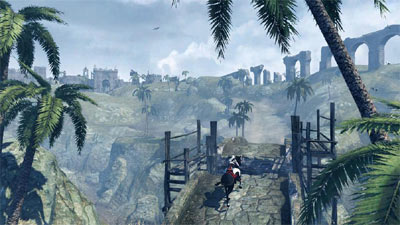
With the wide open, do anything environment and the new take on the traditional action game control scheme, Assassin’s Creed is shaping up to be one of the Christmas season’s best games. We’ll have the full review when the game shows up in November.
We take a closer look at Ubisoft Montreal’s next possible gaming masterpiece
July 13, 2006 – Pop culture has been good to the Crusades; careful not to completely murder it as other time periods have been (note: WWII). When we do finally see a game set in this time, we get a special treat involving acrobatic character movement, sweet counter-based combat, and an environment that acts as real as any videogame we’ve ever seen.
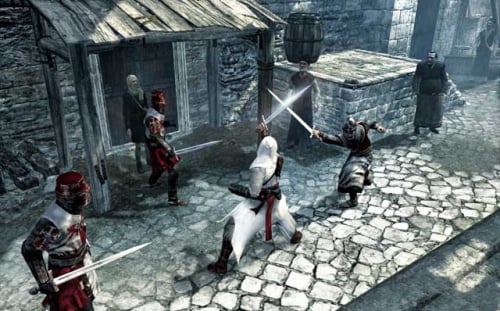
That, in a nutshell, sums up Assassin’s Creed, the upcoming action/adventure/sandbox-medieval assassination simulator. Developed by Ubisoft’s Montreal studio, this title takes a few familiar numbers from Prince of Persia, Thief, and any open-ended adventure game you can think of, and puts you in the position to change the political and military outlook of the 12th Century Middle-East.
Players will experience Jerusalem during the Third Crusade as assassin Altair, brother to a sect of warriors that attempt to stabilize the region by eliminating the leadership of both sides of the conflict. In fact, the brotherhood featured in this game is taken directly from the sect that had been coined “assassins.” Ubisoft gets points for historical references!
These environments look unlike anything we have ever seen in videogames thus far. Teams of civilians react to everything that Altair does, whether it is slinking through a crowd quietly or otherwise. Take, for example, Altair creeping through a market in search of his target. If he quietly surveys his situation without doing anything to warrant extra attention, the surrounding civilians will think none-the-wiser and continue about their day. If he, on the other hand, drops from a rooftop on the streets below, surrounding NPCs will stare in amazement, some choosing to flee or defend themselves to your overly-aggressive maneuver. Even worse, guards will take notice of such activities and be all over you before in short order.>
Assassin’s Creed has been designed with a sort of “urban camouflage” in mind. If there is a crowd listening to a public speaker or watching a public show, Altair can gently nudge his way through a crowd, much like you would politely maneuver through a Dave Matthews concert or something. This calls no attention to any guards in the area and, if you have the time, is the optimal mode of stealth movement. However, if your mark is making an exit, or time is otherwise running short, you can shove through the crowd and towards a quick kill.
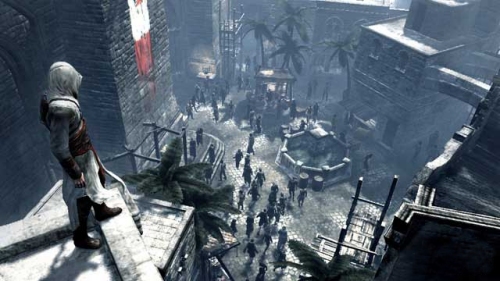
Any good assassin, ninja, or CIA agent knows that the escape is more important than the actual kill. After all, slaughtering a military general, religious leader, or other high profile mark, in broad daylight is likely to piss off more than a few people. In escaping, or interacting with the world in general, just about anything is possible given the right frame of mind and understanding of physics. Plenty of attention has been given to “climbing physics.” In this world, anything that juts out from a wall two inches or more can be scaled. Why settle for the ladder leading to that axe-wielding executioner when you can climb up that tavern wall using the awnings, tavern sign, and window sills? The physics behind Altair’s movements are super-realistic, allowing players to perform sweet acrobatic leaps and hangs. On the other side of the coin, players are reminded of their mortality by increasing your tendency to fall as your speed increases. In other words, you can scale a wall like no one’s business, but if you take a decent shove while running you will be put on your back.
The combat engine is mostly based on reversal maneuvers. For example, if you do come face-to-face with a guard, you could go swiping away at him, but you would most likely be cut down for your lack of finesse. Instead, it helps to let the guard make his first move and use your superior speed and agility to perform wicked-cool combos, with or without a weapon in hand. With this style of combat, one-on-one encounters should be little challenge, but large crowds will be difficult to manage.
There has been a little speculation with this title as the E3 demo that was given behind closed doors showed a “game over” screen that looked like a futuristic HUD that was totally out of place given the rest of the game’s atmosphere. Perhaps Ubisoft has something up its sleeve for players later on? Or maybe, this is just a smokescreen that means little, or even nothing. Only time will tell.
